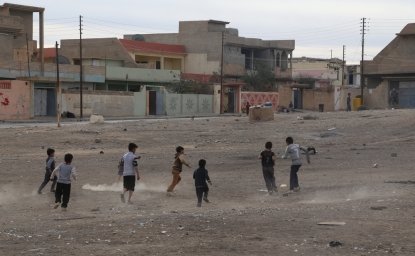By Cameron Glenn
Current leaders
Both Iran and Saudi Arabia are ruled by leaders with virtually unchecked authority. Ayatollah Ali Khamenei has been Iran's supreme leader since 1989, and King Salman has ruled Saudi Arabia since January 2015.
 Iran
Iran
 Saudi Arabia
Saudi Arabia
Supreme Leader Ayatollah Ali Khamenei
Born in 1939 to a traditional family, Ali Khamenei followed in his father’s footsteps and became a cleric. He joined the struggle against the monarchy in the 1960s and spent several years in prison before the 1979 revolution.
Khamenei’s sacrifices for the Islamic revolution and close relationship with Ayatollah Ruhollah Khomeini helped him to attain power within the new government. He served as president for two terms from 1981 to 1989. When Khomeini died in 1989, he left no designated successor. Khamenei was selected by the Assembly of Experts as the second supreme leader, despite the objection of some senior clerics who felt he lacked the theological credentials.
Khamenei still upholds the revolutionary and anti-Western narrative of the 1979 revolution. The United States and its allies, especially Israel, are trying to undermine Iran and the progress of Muslim nations, according to his worldview.
Click here for more information on Khamenei.
King Salman bin Abdulaziz al Saud
King Salman was born in Riyadh in 1935. He was one of seven sons of Abdul Aziz Ibn Saud and Hussa bint Ahmad Sudairi. He studied religion and modern science at the Prince’s School in Riyadh, which was established by King Abdul Aziz to educate his sons.
He served as Governor of Riyadh from 1955 to 1960 and 1963 to 2011, overseeing its evolution into a major city. He was appointed as Minister of Defense in 2011, and became the Crown Prince in 2012.
King Salman ascended the throne in January 2015, at the age of 79, after the death of his brother King Abdullah. King Salman has suffered at least one stroke, and rumors have circulated about his ailing health. He appointed Muqrin bin Abdulaziz as Crown Prince, the youngest living son of King Abdul Aziz, but later replaced him with his nephew, Interior Minister Mohammad bin Nayef. King Salman’s 30-year-old son, Prince Mohammed bin Salman, is the Deputy Crown Prince and Minister of Defense.
King Salman is conservative and has cautioned that “social and cultural factors” prevent reforms from moving too quickly in the kingdom.
Qualifications and Selection
Both Iran and Saudi Arabia emphasize moral qualities in selecting their leaders, and both emphasize that there is no difference between the ruler and the ruled. But the two differ on the leader’s qualifications and selection process.
 Iran
Iran
 Saudi Arabia
Saudi Arabia
The Constitution
Article 109
Following are the essential qualifications and conditions for the Leader:
•a. scholarship, as required for performing the functions of mufti in different fields of fiqh.
•b. Justice and piety, as required for the leadership of the Islamic Ummah [nation].
•c. right political and social perspicacity, prudence, courage, administrative facilities and adequate capability for leadership.
In case of multiplicity of persons fulfilling the above qualifications and conditions, the person possessing the better jurisprudential and political perspicacity will be given preference.
Article 107
The Leader thus elected by the Assembly of Experts shall assume all the powers of the wilayat al-amr and all the responsibilities arising therefrom. The Leader is equal with the rest of the people of the country in the eyes of law.
Article 5
During the Occultation of the Wart al-'Asr (may God hasten his reappearance), the wilayah and leadership of the Ummah devolve upon the just ['adil] and pious [muttaqil faqih, who is fully aware of the circumstances of his age; courageous, resourceful, and possessed of administrative ability, will assume the responsibilities of this office in accordance with Article 107.
Article 111
Whenever the Leader becomes incapable of fulfilling his constitutional duties...or it becomes known that he did not possess some of the qualifications initially, he will be dismissed.
The Basic Law of Governance
Chapter 2, article 5
• Rulers of the country shall be from amongst the sons of the founder King Abdulaziz bin Abdulrahman Al-Faisal Al-Saud, and their descendants.
• The most upright among them shall receive allegiance according to Almighty God's Book and His Messenger's Sunna (Traditions).
Chapter 2, Article 6:
In support of the Book of God and the Sunna of His Messenger (PBUH), citizens shall give the pledge of allegiance (bay'a) to the King, professing loyalty in times of hardship and ease.
Saudi Succession Law, 2006
Article 6
When the king dies, the Allegiance Commission shall call for swearing allegiance to the Crown Prince as a king of the country in accordance with this statute and the Basic Law of the Government.
Article 7
After the swearing of allegiance and after consultations with the Allegiance Commission members, the king shall choose one, two, or three candidates whom he deems suitable for the position of Crown Prince. He shall present this choice to the Allegiance Commission. The commission must endeavor to nominate one of these candidates by consensus to be named Crown Prince. In case the Allegiance Commission does not nominate any of these, it shall nominate whom it thinks would be suitable to become Crown Prince.
King Fahd’s speech accompanying the 1992 Basic Law
“There is no difference between the ruler and the ruled. They are equal before the law of God.”
Iran: Leadership is based on the Shiite concept of “velayat-e faqih,” or “guardianship of the jurist.” The supreme leader is empowered to provide political and religious leadership in the absence of the 12th imam. The 86-member Assembly of Experts is a body of clerics tasked with appointing the supreme leader based on his scholarship, justice, and piety. The body can also theoretically supervise and remove the supreme leader if he is not fulfilling his duties. In practice, the council rarely challenges or criticizes the supreme leader.
Saudi Arabia: The Basic Law stipulates that the king must be chosen from Abdul Aziz’s sons and their male descendants. When a king dies, he is succeeded by the Crown Prince. In 2006, King Abdullah issued a royal decree creating the Allegiance Council, a committee of princes from each line of the Saud family responsible for issues of succession. The council is tasked with approving the king’s choice for Crown Prince within 30 days of acceding the throne. It is also responsible for transferring power if the king is unable to continue his duties for medical reasons.
Duties
Both Iran’s supreme leader and Saudi Arabia’s king hold substantial authority over other branches of government. Both are tasked with ruling according to Islam.
 Iran
Iran
 Saudi Arabia
Saudi Arabia
The Constitution
Preamble
The Constitution provides for the establishment of leadership by a faqih possessing the necessary qualifications...Such leadership will prevent any deviation by the various organs of State from their essential Islamic duties.
Article 110
Following are the duties and powers of the Leadership:
1.Delineation of the general policies of the Islamic Republic of Iran after consultation with the Nation's Exigency Council.
2.Supervision over the proper execution of the general policies of the system.
3.Issuing decrees for national referenda.
4.Assuming supreme command of the armed forces.
5.Declaration of war and peace, and the mobilization of the armed forces.
6.Appointment, dismissal, and acceptance of resignation of:
a. the fuqaha on the Guardian Council.
b. the supreme judicial authority of the country.
c. the head of the radio and television net- work of the Islamic Republic of Iran.
d. the chief of the joint staff.
e. the chief commander of the Islamic Revolution Guards Corps.
f. the supreme commanders of the armed forces.
7.Resolving differences between the three wings of the armed forces and regulation of their relations.
8.Resolving the problems, which cannot be solved by conventional methods, through the Nation's Exigency Council.
9.Signing the decree formalizing the election of the President of the Republic by the people...
10.Dismissal of the President of the Republic, with due regard for the interests of the country...
11.Pardoning or reducing the sentences of convicts, within the framework of Islamic criteria, on a recommendation [to that effect] from the Head of judicial power.
The Basic Law of Governance
Chapter 6, Article 55
The King shall rule the nation according to the Sharia. He shall also supervise the implementation of the Sharia, the general policy of the State, and the defense and protection of the country.
Chapter 6, Article 56
The King is the Prime Minister. Members of the Council of Ministers shall assist him in the performance of his mission...
Article 57
The King shall appoint and relieve deputies of the Prime Minister and member minister of the Council by Royal Decree.
Deputies of the Prime Minister and member ministers of the Council shall be jointly responsible to the King for the implementation of the Sharia, laws and the general policy of the State.
The King is entitled to dissolve and reconstitute the Council of Ministers.
Article 58
The King shall appoint those who are at the rank of ministers and deputy ministers, and those who are at the highest grade and relieve them by a Royal Decree as provided by the Law. Ministers and heads of independent departments shall be answerable to the King in respect of the ministries and agencies they head.
Article 60
The King is the Supreme Commander of the Armed Forces. He shall appoint and dismiss officers form service, as provided by terms of the Law.
Article 61
The King shall announce any state of emergency or general mobilization and shall declare war. The Law shall specify rules for this purpose.
Article 68
...The King may dissolve and reconstitute Majlis Ash-Shura.
Article 69
The King may summon Majlis Ash-Shura and the Council of Ministers for a joint session...
Article 70
Laws, international agreements, treaties and concessions shall be approved and amended by Royal Decrees.
Iran: Supreme Leader Khamenei holds constitutional authority or significant influence over all branches of government, the military, and the judiciary. He oversees the 12-member Guardian Council, which vets electoral candidates and can veto parliamentary decisions. Khamenei also has authority over Iran’s largely state-owned economy, and has discretionary authority over oil revenues.
Saudi Arabia: Extensive powers are allocated to Saudi Arabia’s King Salman, who is the “ultimate arbiter” of the executive, legislative, and judicial branches, according to the Basic Law. The king acts as prime minister and head of the armed forces. He has authority to appoint members of the Council of Ministers and the Majles al Shura, or consultative council. He also holds the title of Custodian of the Two Holy Mosques in Mecca and Medina, two of the most important sites in Islam.
This piece is part of a four-part series on Iran and Saudi Arabia.
Photo credits: King Salman via Wikimedia Commons;
Cameron Glenn is assistant editor of "The Islamists" and a senior program assistant at the U.S. Institute of Peace.
Author

The Islamists
Learn more about Hamas and how it relates to similarly aligned organizations throughout the region. Read more

Explore More
Browse Insights & Analysis
Israel Expands Operations on Multiple Fronts: Perspectives on the Conflict


